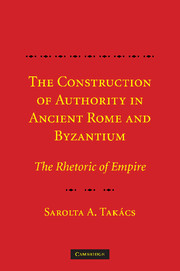Book contents
Conclusion
Published online by Cambridge University Press: 15 October 2009
Summary
Catalogs of imperial or royal virtues have a long history, of course, and begin long before the Romans fashioned their own historical and educational narrative. Homer's epics outlined the kind of education that was to result in a virtuous ruler. How to behave virtuously was, and still is, part of a shared collective memory. What was identified as virtuous and worthy of emulation drove ancient historical narratives, which very much inform our recollection of the past. Modern empires have drawn cultural and political legitimization from Rome with its retroactively construed history. Writers and artists of modernity, such as Thomas Babington Macaulay and Constantino Brumidi, have found in Cincinnatus and Horatius, for example, heroes worth depicting because these Romans encapsulated qualities that had meaning beyond their original context. Now, as then, adherence to old-fashioned virtues (or values) was held, or rather was rhetorically fashioned, “to create the basis of a moral revival,” the key to a new political era; in other words, the means to exert dominance over others is presented as a moral mandate. The foremost proponent of this mandate was, and still is, the politician eager to explain his country's hegemony as a justified, even as a divinely ordained, act. It is also the leader of such a hegemony who symbolically embodies the country's defining virtues.
In ancient Rome, such a leader was termed “father of his country.”
- Type
- Chapter
- Information
- The Construction of Authority in Ancient Rome and ByzantiumThe Rhetoric of Empire, pp. 147 - 154Publisher: Cambridge University PressPrint publication year: 2008



